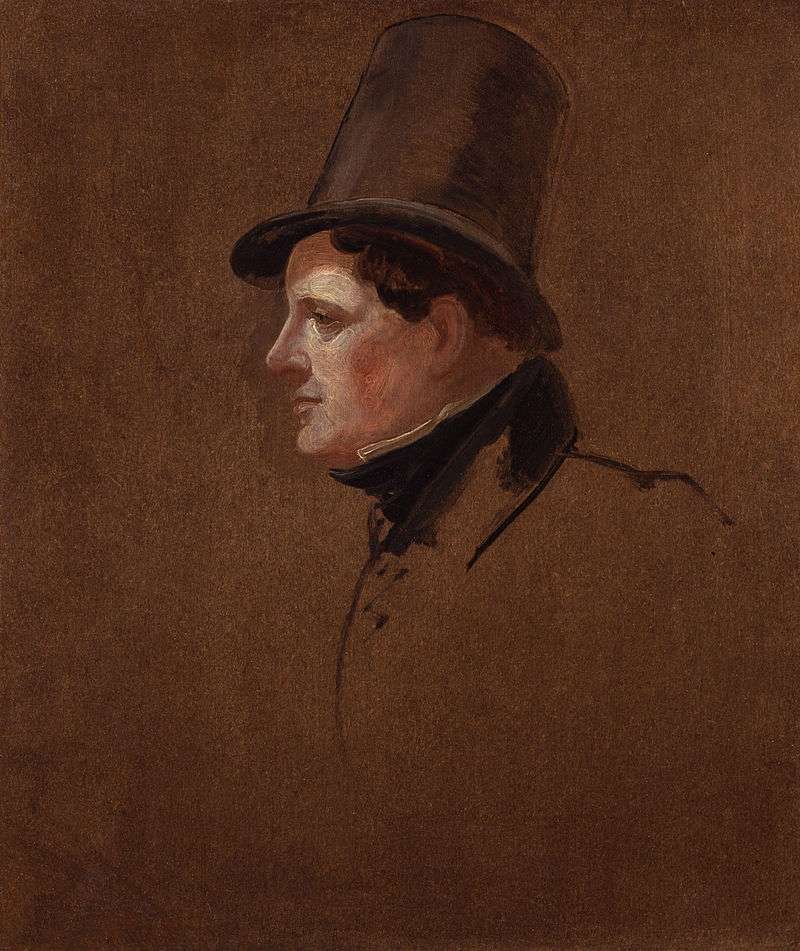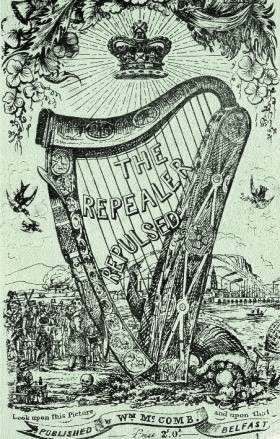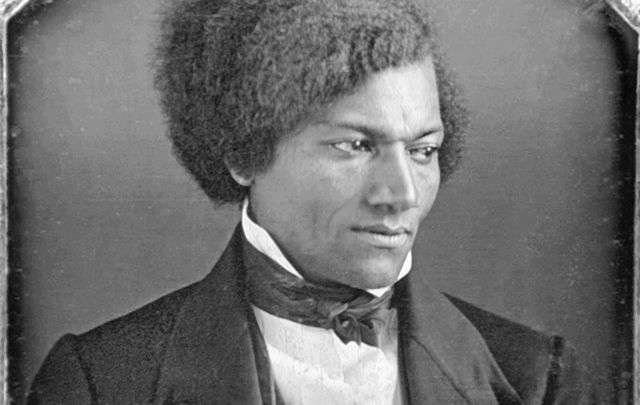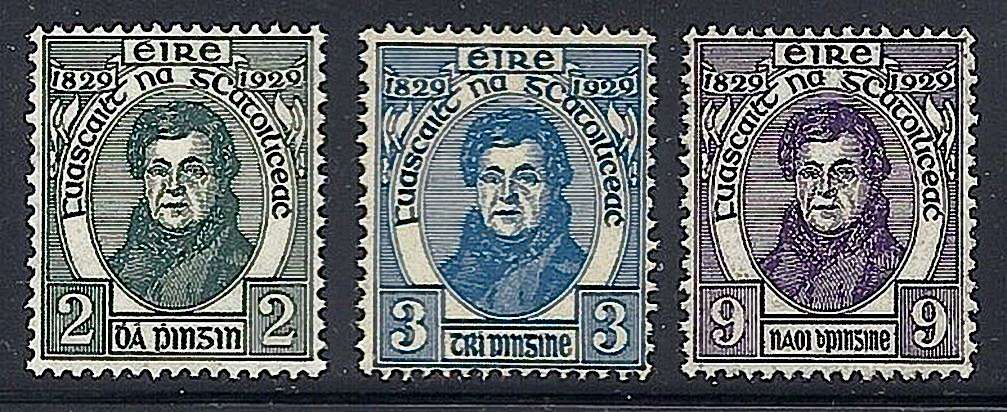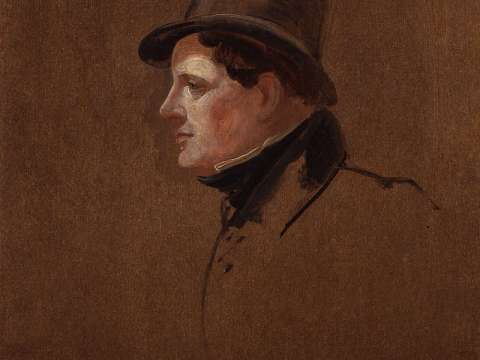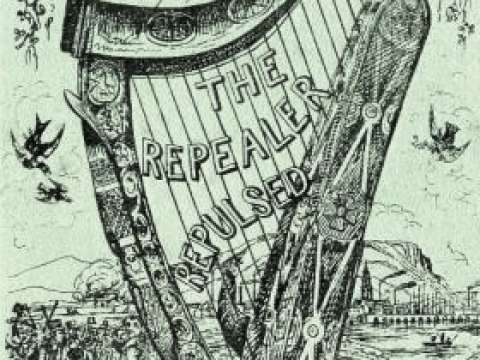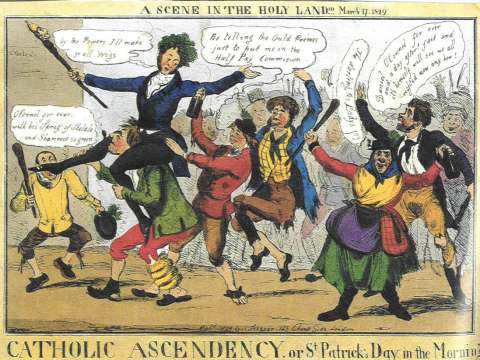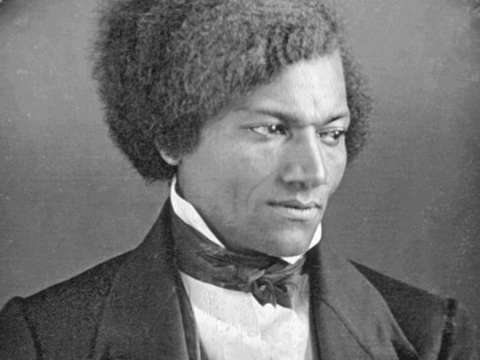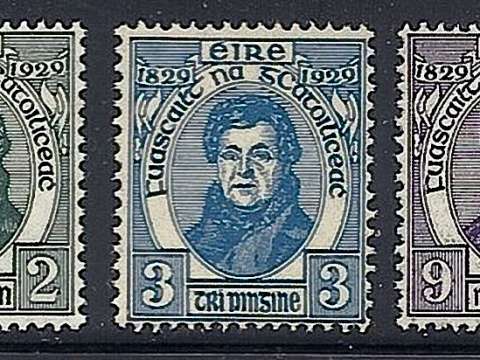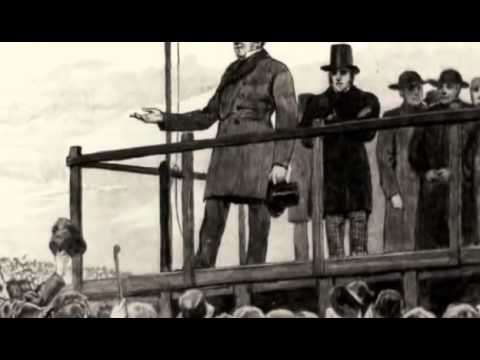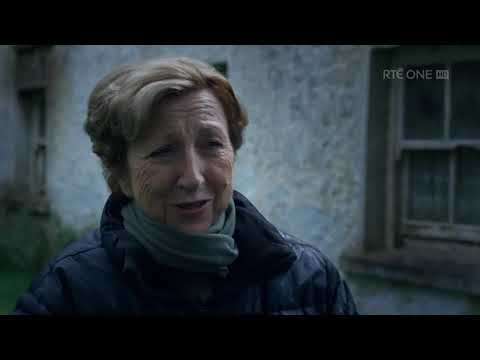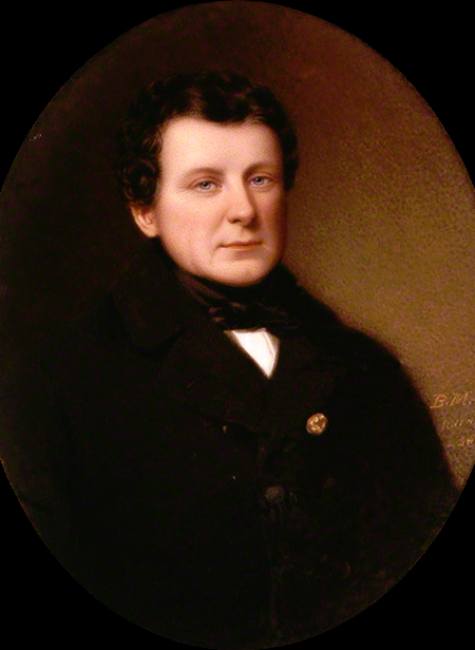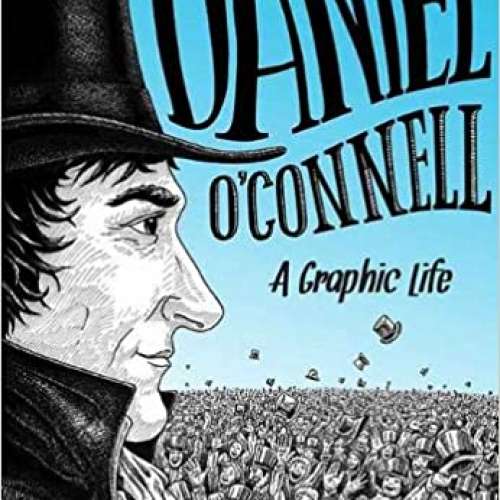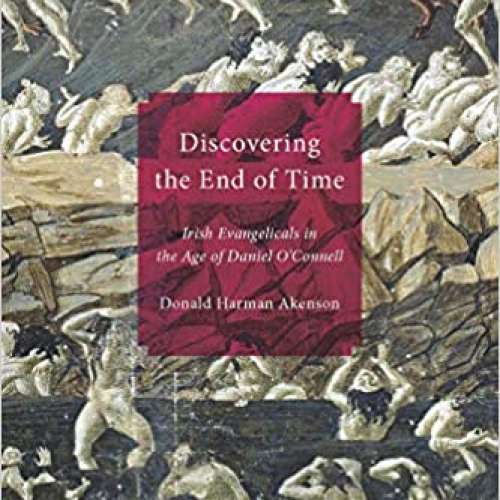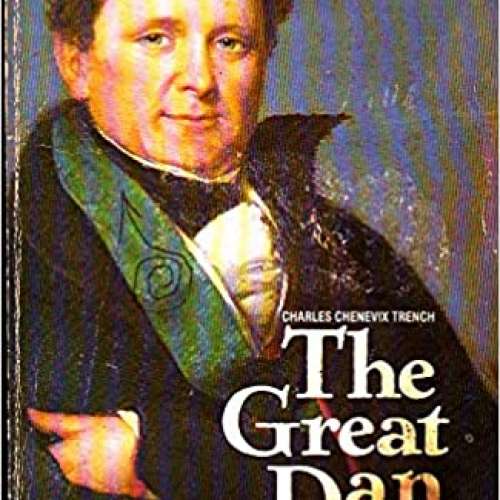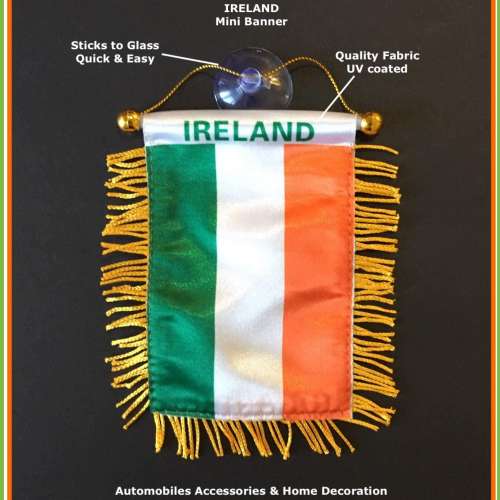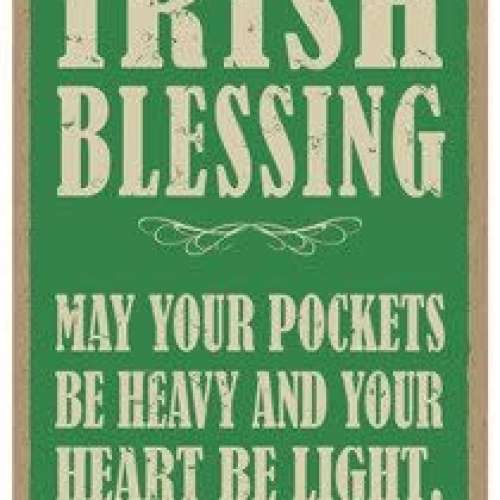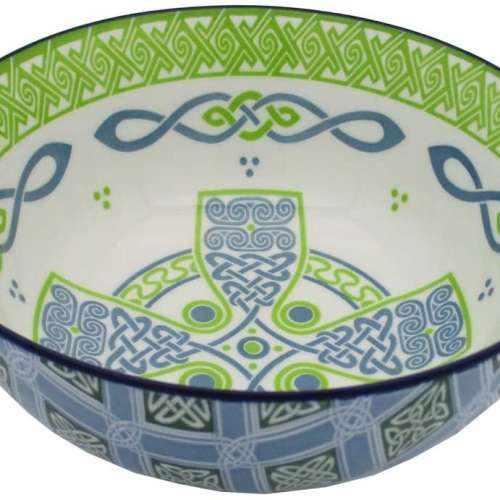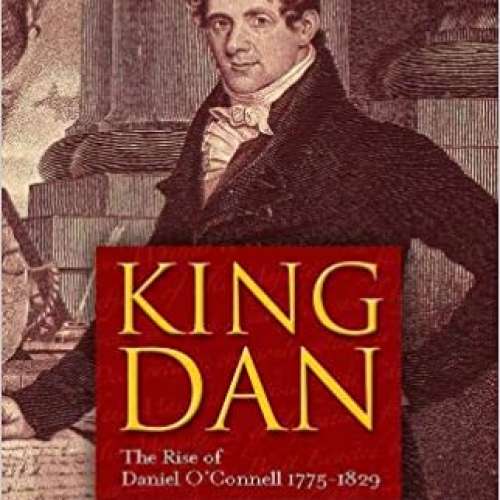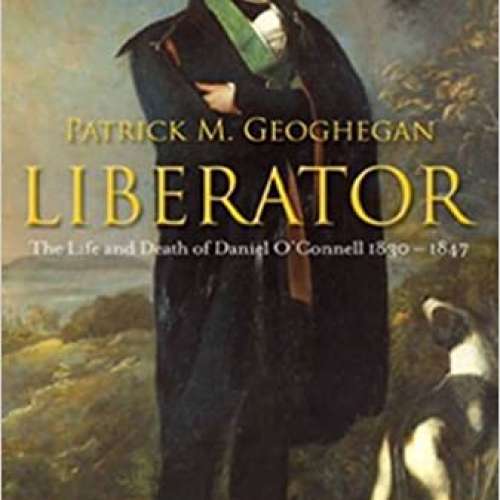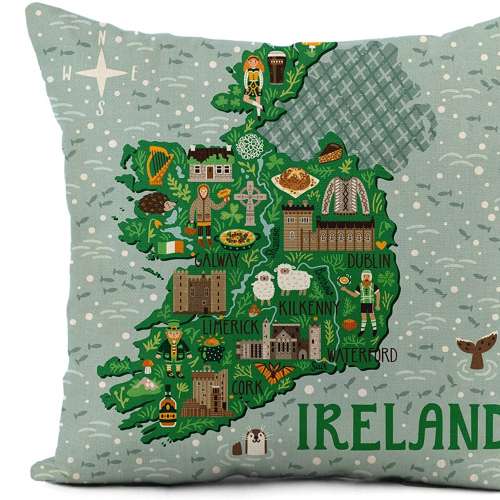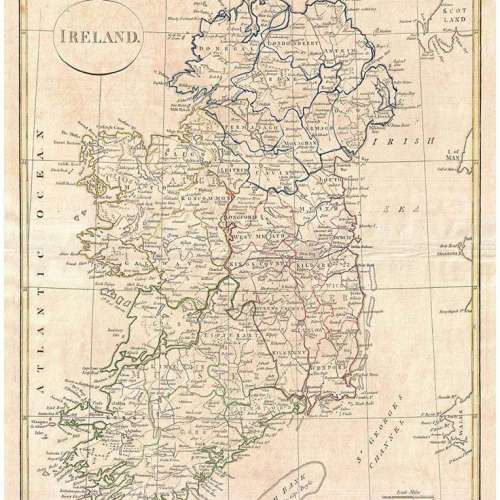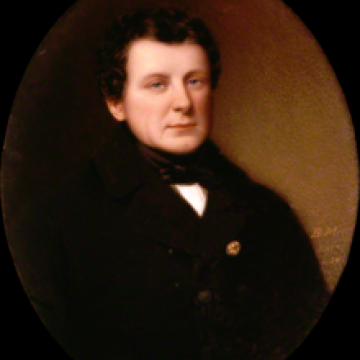

Daniel O'Connell (1775-1847)

Nothing is politically right which is morally wrong.
Daniel O'Connell, hailed in his time as The Liberator, was the acknowledged political leader of Ireland's Roman Catholic majority in the first half of the 19th century. His mobilisation of Catholic Ireland through to the poorest class of tenant farmer helped secure Catholic emancipation in 1829 and allowed him to take a seat in the United Kingdom Parliament to which he had twice been elected. At Westminster O'Connell championed liberal and reform causes he was renowned internationally as an abolitionist but failed in his declared objective for Ireland: the restoration of a separate Irish Parliament through repeal of the 1800 Acts of Union. Against the background of a growing agrarian crisis and, in his final years, of the Great Irish Famine, O'Connell contended with dissension at home. Criticism of his political compromises and system of patronage led to a split in the national movement he had singularly led.
Early and professional life
Kerry and France
O'Connell was born at Carhan near Cahersiveen, County Kerry, to the O'Connells of Derrynane, a wealthy Roman Catholic family that had twice been dispossessed of lands. His parents were Morgan O'Connell and Catherine O'Mullane. The poet Eibhlín Dubh Ní Chonaill was an aunt; and Daniel Charles, Count O'Connell, an Irish Brigade officer in the service of the King of France and twelve years a prisoner of Napoleon, an uncle. O'Connell grew up in Derrynane House, the household of his bachelor uncle, Maurice "Hunting Cap" O'Connell landowner, smuggler and justice of the peace who made the young O'Connell his heir presumptive
In 1791, under his uncle's patronage, O'Connell and his elder brother Maurice were sent to continue their schooling in France. Revolutionary upheaval and their mob denunciation as "young priests" and "little aristocrats", persuaded them in January 1793 to flee their Jesuit college at Douai. They crossed the English Channel with the brothers and United Irishmen, John and Henry Sheares who displayed a handkerchief soaked, they claimed, in the blood of Louis XVI, the late executed king. The experience is said to have left O'Connell with a lifelong aversion to mob rule and violence.
1798 and Legal Practice
After further legal studies in London, including a pupillage at Lincoln's Inn, O'Connell returned to Ireland in 1795. Henry Grattan's third Catholic Relief Act in 1793, while maintaining the Oath of Supremacy that excluded Catholics from parliament, had granted them the vote on the same terms as Protestants and removed most of the remaining barriers to their professional advancement. O'Connell, nonetheless, remained of the opinion that in Ireland the whole policy of the Irish Parliament and of the London-appointed Dublin Castle executive, was "to repress the people and to maintain the ascendancy of a privileged and corrupt minority".
On 19 May 1798, O'Connell was called to the Irish Bar. Four days later, the United Irishmen staged their ill-fated rebellion. Toward the end of his life O'Connell claimed to have been a United Irishman. Asked how that could be reconciled with his membership of the government's volunteer Yeomanry the Lawyers Artillery Corps, he replied that in '98 "the popular party was so completely crushed that the only chance of doing any good for the people was by affecting ultra loyalty."
O'Connell appeared to have had little faith in the United Irish conspiracy or in their hopes of French intervention. He sat out the rebellion in his native Kerry. When in 1803 Robert Emmet faced execution for attempting an insurrection in Dublin he was condemned by O'Connell: as the cause of "so much bloodshed" Emmett had forfeited any claim to "compassion."
In the decades that followed, O'Connell practised private law and, although invariably in debt, reputedly had the largest income of any Irish barrister. In court he sought to prevail by refusing deference, showing no compunction in studying and exploiting a judge's personal and intellectual weaknesses. He was long ranked below less accomplished Queen's Counsels, a status not open to Catholics until late in his career. But when offered he refused the senior judicial position of Master of the Rolls.
Family
In 1802 O'Connell married his third cousin, Mary O'Connell. He did so in defiance of his benefactor, his uncle Maurice, who believed his nephew should have sought out an heiress. They had four daughters three surviving, Ellen 1805, Catherine 1808, Elizabeth 1810, and Rickarda 1815 and four sons. Maurice 1803, Morgan 1804, John 1810, and Daniel 1816, all of whom were all to join their father as Members of Parliament. Despite O'Connell's early infidelities, the marriage was happy and Mary's death in 1837 was a blow from which her husband is said never to have recovered.
Political beliefs
Church and state
O'Connell's personal principles reflected the influences of the Enlightenment and of radical and democratic thinkers some of whom he had encountered in London and in masonic lodges. He was greatly influenced by William Godwin's Enquiry Concerning Political Justice public opinion the root of all power, civil liberty and equality the bedrock of social stability, and was, for a period, converted to Deism by his reading of Thomas Paine's The Age of Reason. O'Connell from the 1820s has been described as an "English rationalist utilitarian", a "Benthamite". For a time Jeremy Bentham and O'Connell did become personal friends as well as political allies.

At Westminster O'Connell played a major part in passage of the Reform Act of 1832 and in the abolition of Slavery 1833 a cause in which he continued to campaign. He welcomed the revolutions of 1830 in Belgium and France, and advocated "a complete severance of the Church from the State". Such liberalism made all the more intolerable to O'Connell the charge that as "Papists" he and his co-religionists could not be trusted with the defence of constitutional liberties.
O'Connell protested that, while "sincerely Catholic", he did not "receive" his politics "from Rome". In 1808 "Friends of Emancipation", Henry Grattan among them, proposed that fears of "Popery" might be allayed if the Crown were accorded the same right exercised by continental monarchs, a veto on the confirmation of Catholic bishops. Even when, in 1814, the Curia itself then in a silent alliance with Britain against Napoleon proposed that bishops be "personally acceptable to the king", O'Connell was unyielding in his opposition. Refusing any instruction from Rome as to "the manner of their emancipation", O'Connell declared that Irish Catholics should be content to "remain for ever without emancipation" rather than allow the king and his ministers "to interfere" with the Pope's appointment of their senior clergy.
Church and nation
In his travels in Ireland in 1835, Alexis de Tocqueville remarked on the "unbelievable unity between the Irish clergy and the Catholic population." The people looked to the clergy, and the clergy "rebuffed" by the "upper classes" "Protestants and enemies", had "turned all its attention to the lower classes; it has the same instincts, the same interests and the same passions as the people; state of affairs altogether peculiar to Ireland". This is a unity, O'Connell argued, the bishops would have sacrificed had they agreed to Rome submitting their appointments for Crown approval. Licensed by the government they and their priests would have been as little regarded as the Anglican clergy of the Established Church. For O'Connell this would have represented a strategic loss. In most districts of the country, the priest was the sole figure, with standing independent of the Protestant landlords and magistrates, around whom a national movement could be reliably built. It would also have been to compromise the very conception of the Irish people as a nation.
Against the charge of political dictation from Rome, O'Connell insisted that the Catholic Church in Ireland "is a national Church". At the same time, he openly declared that "if the people rally to me they will have a nation for that Church". For O'Connell Catholicism defined the nation for which he sought both a civil and political emancipation. The "positive and unmistakable" mark of distinction between Irish and English, according to O'Connell's newspaper, the Pilot, was "the distinction created by religion".
Protestant Opposition
O'Connell "treasured his few Protestant Repealers". But to many of his contemporaries he appeared "ignorant" of the Protestant largely Presbyterian majority society of the north-east, Ulster, counties. Here there was already premonition of future Partition. While protesting that its readers wished only to preserve the Union, in 1843 Belfast's leading paper, the Northern Whig, proposed that if differences in "race" and "interests" argue for Ireland's separation from Great Britain then "the Northern 'aliens', holders of 'foreign heresies' as O'Connell says they are" should have their own "distinct kingdom", Belfast as its capital.

O'Connell seemed "implicitly" to concede the separateness of the Protestant North. He spoke "invading" Ulster to rescue "our Persecuted Brethren in the North". In the event, and in the face of the hostile crowds that disrupted his one foray to Belfast in 1841 "the Repealer repulsed!", he "tended to leave Ulster strictly alone" Perhaps persuaded by their presence through much of the south as but a thin layer of officials, landowners and their agents, O'Connell proposed Protestants had not the staying power of true "religionists". Their ecclesiastical dissent and not alone their unionism was a function, he argued, of political privilege. To Dr Paul Cullen the future Cardinal and Catholic Primate of Ireland in Rome, O'Connell wrote:
The Protestants of Ireland... are political Protestants, that is, Protestants by reason of their participation in political power... If the Union were repealed and the exclusive system abolished, the great mass of the Protestant community would with little delay melt into the overwhelming majority of the Irish nation. Protestantism would not survive the Repeal ten years.
O'Connell's view of the link between nation and faith is one that a number of Protestant Irish nationalists in converting to Catholicism may have embraced: Repealer and O'Connell's mayoral secretary William O'Neill Daunt, Home Ruler Joseph Biggar, Gaelic Leaguer William Gibson, Sinn Féiner William Stockley, and, on the day of his execution, Roger Casement.
Disavowal of violence
Consistent with the position he had taken publicly in relation to rebellions of 1798 and 1803, O'Connell focused upon parliamentary representation and popular, but peaceful, demonstration to induce change. "No political change", he offered, "is worth the shedding of a single drop of human blood". His critics, however, were to see in his ability to mobilise the Irish masses an intimation of violence. It was a standing theme with O'Connell that if the British establishment did not reform the governance of Ireland, Irishmen would start to listen to the "counsels of violent men".
O'Connell insisted on his loyalty, greeting George IV effusively on his visit to Ireland in 1821. In contrast to his later successor Charles Stewart Parnell although like O'Connell, himself a landlord, O'Connell was also consistent in his defence of property. Yet he was willing to defend those accused of political crimes and of agrarian outrages. In his last notable court appearance, the Doneraile conspiracy trials of 1829, O’Connell saved several tenant Whiteboys from the gallows.
Abandonment of the Irish language
Irish was O'Connell's mother tongue and that of the vast majority of the rural population. Yet he insisted on addressing his typically open-air meetings in English, sending interpreters out among the crowd to translate his words. At a time when "as a cultural or political concept 'Gaelic Ireland' found few advocates", O'Connell declared:
I am sufficiently utilitarian not to regret [the] gradual abandonment [of Irish]... Although the language is associated with many recollections that twine round the hearts of Irishmen, yet the superior utility of the English tongue, as the medium of all modern communication is so great, that I can witness, without a sigh, the gradual disuse of Irish.
O’Connell "indifference to the fate of the language", a decade before the Famine, was consistent with the policies of the Catholic Church which under Cullen was to develop a mission to the English-speaking world and of the government-funded National Schools. Together, these were to combine in the course of the century to accelerate the near complete conversion to English.
There is no evidence to suggest that that O'Connell saw "the preservation or revival or any other aspect of 'native culture' in the widest sense of the term as essential to his political demands". O'Connell was not what would later be understood as a cultural nationalist.
Emancipation and the agrarian crisis
The "Liberator"
To broaden and intensify the campaign for emancipation, in 1823, O'Connell established Catholic Association. For a "Catholic rent" of a penny a month, this, for the first time, drew the labouring poor into a national movement. Their investment enabled O'Connell to mount "monster" rallies crowds of over 100,000 that stayed the hands of authorities, and emboldened larger enfranchised tenants to vote for pro-Emancipation candidates in defiance of their landlords.
The government moved to suppress the Association by a series of prosecutions, but with limited success. Already in 1822 O'Connell had manoeuvred his principal foe, the Attorney General, William Saurin, into actions sufficiently intemperate to ensure his removal by the Lord Lieutenant. His confrontation with Dublin Corporation, equally unbending in its defence of the "Protestant Constitution", took a more tragic turn.
Outraged at O'Connell's refusal to retract his description of the corporation as "beggarly", one of their number, John D'Esterre, challenged O'Connell to a duel. As an experienced duellist, there was some hope that D'Esterre, would dispose of a man considered "worse than a public nuisance". In the event it was O'Connell who mortally wounded D'Esterre. Distressed by the killing, O'Connell offered to share his income with D'Esterre's widow. She consented to a small allowance for her daughter, which O'Connell regularly paid for more than thirty years until his death.

Some months later, O'Connell was engaged to fight a second duel with the Chief Secretary for Ireland, Robert Peel, O'Connell's repeated references to him as "Orange Peel" "a man good for nothing except to be a champion for Organism" being the occasion. Only O'Connell's arrest in London en route to their rendezvous in Ostend prevented the encounter, and the affair went no further. But in 1816, following his return to faithful Catholic observance, O'Connell made “a vow in heaven” never again to put himself in a position where he might shed blood. In "expiation for the death d'Esterre", he is said thereafter to have accepted the insults of men whom he refused to fight "with pride".
In 1828 O'Connell defeated a member of the British cabinet in a parliamentary by-election in County Clare. His triumph, as the first Catholic to be returned in a parliamentary election since 1688, made a clear issue of the Oath of Supremacy—the requirement that MPs acknowledge the King as "Supreme Governor" of the Church and thus forswear the Roman communion. Fearful of the widespread disturbances that might follow from continuing to insist on the letter of the oath, the government finally relented. With the Prime Minister, the Duke of Wellington, persuading the King, George IV, and the Home Secretary, Sir Robert Peel, engaging the Whig opposition, the Catholic Relief Act became law in 1829. The act was not made retroactive so that O'Connell had to stand again for election. He was returned unopposed in July 1829.
Such was O'Connell's prestige as "the Liberator" that George IV reportedly complained that while "Wellington is the King of England", O'Connell was "King of Ireland", and he, himself, merely "the dean of Windsor." Some of O’Connell younger lieutenants in the new struggle for Repeal—the "Young Irelanders"—were critical of the leader's acclaim. Michael Doheny noted that the 1829 act had only been the latest in a succession of "relief" measures dating back to the Papists Act 1778. Honour was due rather to those who had "wrung from the reluctant spirit of a far darker time the right of living, of worship, of enjoying property, and exercising the franchise".
Tenant Disenfranchisement and the Tithe War
Entry to parliament had not come without a price. Bringing it into line with England, the 1829 Act raised the property threshold for voting in county seats five-fold, eliminating the middling tenantry the Irish "forty-shilling freeholders" who had risked much in defying their landlords on O'Connell's behalf in the Clare election. The measure reduced the Irish Catholic electorate from 216,000 voters to just 37,000.
Among the Catholic elite there was a feeling that the new ten-pound franchise might actually "give more power to Catholics by concentrating it in more reliable and less democratically dangerous hands". The Young Irelander John Mitchel believed that this was the intent: to detach propertied Catholics from the increasingly agitated rural masses. In a pattern that had been intensifying from the 1820s as landlords cleared land to meet the growing livestock demand from England, tenants had been banding together to oppose evictions, and to attack tithe and process servers. De Tocqueville recorded these Whiteboys and Ribbonmen protesting:
The law does nothing for us. We must save ourselves. We have a little land which we need for ourselves and our families to live on, and they drive us out of it. To whom should we address ourselves?... Emancipation has done nothing for us. Mr. O'Connell and the rich Catholics go to Parliament. We die of starvation just the same.
O'Connell did seek to lead the agitation against the tithes levied upon that tenants in support of the Anglican establishment--"the landlords' Church". An initially peaceful campaign of non-payment turned violent in 1831 when the newly founded Irish Constabulary in lieu of payment began to seize property and conduct evictions. Although opposed to the use of force, O'Connell defended those detained in the so-called Tithe War. For all eleven accused in the death of fourteen constables in the Carrickshock incident, O'Connell helped secure acquittals. Yet fearful of embarrassing his Whig allies, in 1838 he rejected the call of the Protestant tenant-righter William Sharman Crawford for the complete elimination of the Church of Ireland levy. O'Connell accepted the Tithe Commutation Act. This did effectively exempt the majority of cultivators—those who held land at will or from year to year—from the charge, while offering those still liable relief: a 25 percent reduction and a forgiveness of arrears. On the other hand, it transferred the onus for its collection from the church minister to the landlord who had the authority to evict and a still unchecked freedom to appropriate any and all tenant surpluses through increased rent.
Campaign for repeal of the Union
The meaning of Repeal
O'Connell's call for a repeal the Act of Union, and for a restoration of the Kingdom of Ireland under the Constitution of 1782, may have been less a considered constitutional proposal than "an invitation to treat".
The legislative independence won by Grattan's "Patriot Parliament" in 1782 had left executive power in the hands of London-appointed Dublin Castle administration. In declining to stand as a Repeal candidate, Thomas Moore Ireland's national bard objected that with a Catholic Parliament in Dublin, "which they would be sure to have out and out", this would be an arrangement impossible to sustain. Separation from Great Britain was its "certain consequence", so that Repeal was a practical policy only if in the spirit of the United Irishmen Catholics were again "joined by the dissenters"—the Presbyterians of the North.
But for O'Connell, the historian R.F. Foster suggests that "the trick was never to define what the Repeal meant--or did not mean". It was "emotional claim", an "ideal", with which "to force the British into offering something”.
'Testing' the Union
O'Connell did prepare the ground for the "Home Rule" compromise negotiated between Irish-nationalists and British Liberals from the 1880s. He declared that while he would "never ask for or work" for anything less than an independent legislature, he would accept a "subordinate parliament" as "an instalment". But for the predecessors to Gladstone's Liberals, Lord Melbourne's Whigs, with whom O'Connell sought an accommodation in the 1830s, even an Irish legislature devolved within the United Kingdom was a step too far.
Having assisted Melbourne, through an informal understanding the Lichfield House Compact, to a government majority, in 1835 O'Connell suggested he might be willing to give up the project of an Irish parliament altogether. He declared his willingness to "test" the Union:
The people of Ireland are ready to become a portion of the empire, provided they be made so in reality and not in name alone; they are ready to become a kind of West Britons if made so in benefits and in justice, but if not, we are Irishmen again.
Underscoring the qualifying clause--"if not we are Irishmen again"—historian J.C. Beckett proposes that the change was less that it may have appeared. Under the pressure of a choice between "effectual union or no union", O'Connell was seeking to maximise the scope of shorter-term, interim, reforms.
O'Connell failed to stall the application to Ireland of the new English Poor Law system of Workhouses, the prospect of which, as de Tocqueville found, was broadly dreaded in Ireland. As an alternative to outdoor relief, the Workhouses made it easier for landlords to clear their estates in favour of larger English-export oriented farms. But as regards the general conduct of the Dublin Castle administration under the Whigs, Beckett concludes that "O'Connell had reason to be satisfied, and "the more so as his influence carried great weight in the making of appointments". Reforms opened the police and judiciary to greater Catholic recruitment, and measures were taken to reduce the provocations and influence of the pro-Ascendancy Orange Order.
In 1840 municipal government was reconstructed on the basis of a rate-payer franchise. In 1841, O'Connell became the first Roman Catholic Lord Mayor of Dublin since the reign of James II. The measure was less liberal than municipal reform in England, and it left the majority of population to continue under the landlord-controlled Grand Jury system of county government.
In view of Thomas Francis Meagher, in return for damping down Repeal agitation, a "corrupt gang of politicians who fawned on O'Connell" were being allowed an extensive system of political patronage. The Irish people were being "purchased back into factious vassalage."
In 1842 all eighteen of O'Connell's parliamentary "tail" at Westminster voted in favour of the Chartist petition which, along with its radical democratic demands, included Repeal. But the Chartists in England, and in their much smaller number in Ireland, were also to accuse O'Connell of being unreliable and opportunistic in his drive to secure Whig favour.
The renewal of the campaign
When it was clear that the Whigs would lose office, O'Connell did renew the Repeal campaign. In April 1840 he relaunched the Repeal Association, and published a series of addresses criticising government policy and attacking the Union.
The "people"—the great numbers of tenant farmers, small-town traders and journeymen—O'Connell had rallied to the cause of Emancipation did not similarly respond to his lead on the more abstract proposition of Repeal; neither did the Catholic gentry or middle classes. Many appeared content to explore the avenues for advancement emancipation had opened. As a body, Protestants remained opposed to a restoration of a parliament whose prerogatives they had once championed. The Presbyterians in the north were persuaded that the Union was both the occasion for their relative prosperity and a guarantee of their liberty.
In the June–July 1841 Westminster elections, Repeal candidates lost a third of their seats. In a contest marked by the boycott of Guinness as "Protestant porter", O'Connell's son John himself a brewer—of O'Connell's Ale. failed to hold his father's Dublin seat.
Against a background of growing economic distress, O'Connell was nonetheless buoyed by Archbishop John McHale's endorsement of legislative independence. Opinion among all classes was also influenced from October 1842 by Gavan Duffy's new weekly The Nation'. Read in Repeal Reading Rooms and to passed from hand to hand its mix of vigorous editorials, historical articles and verse, may have reached as many as a quarter of a million readers.
Breaking out of the very narrow basis for electoral politics the vote was not restored to the forty-shilling freeholder until 1885, O'Connell initiated a new series of "monster meetings". These were damaging to the prestige of the government, not only at home, but abroad. O'Connell was becoming a figure of international renown with large and sympathetic audiences in the United States and in France. The Conservative government of Robert Peel considered repression, but hesitated, unwilling to tackle the Anti-Corn Law League which was copying O'Connell's methods in England. Assuring his supporters that Britain must soon surrender, O'Connell declared 1843 "the repeal year."
Tara and Clontarf 1843
At the Hill of Tara by tradition the inaugural seat of the High Kings of Ireland, on the feast-day of the Assumption, 15 August 1843, O'Connell gathered a crowd estimated in the hostile reporting of The Times as close to one million. It took O'Connell's carriage two hours to proceed through the throng, accompanied by a harpist playing Thomas Moore's "The Harp that once through Tara's Halls".
O'Connell planned to close the campaign on 8 October 1843 with an even larger demonstration at Clontarf, on the outskirts of Dublin. As the site of Brian Boru's famous victory over the Danes in 1014, it resonated with O'Connell's increasingly militant rhetoric: "the time is coming", he had been telling his supporters, when "you may have the alternative to live as slaves or to die as freemen". Beckett suggests "O'Connell mistook the temper of the government", never expecting that "his defiance would be put to the test". When it was—when troops occupied Clontarf—O'Connell submitted at once. He cancelled the rally and sent out messengers to turn back the approaching crowds.

O'Connell was applauded by the Church, his more moderate supporters and English sympathisers. But many of the movement rank and file who had been fired by his defiant rhetoric were disillusioned, His loss of prestige might have been greater had the government not, in turn, overplayed its own hand. They sentenced O'Connell and his son John to twelve months for conspiracy.
When released after three months, the charges quashed on appeal to the House of Lords, O'Connell was paraded in triumph through Dublin on a gilded throne. But, approaching seventy years of age, O'Connell never fully recovered his former stature or confidence. Having deprived himself of his most potent weapon, the monster meeting, and with his health failing, O'Connell had no plan and dissension broke out in the Repeal Association.
The break with Young Ireland
The Queen's Colleges controversy
In 1845 Dublin Castle proposed to educate Catholics and Protestants together in a non-denominational system of higher education. In advance of some the Catholic bishops Archbishop Daniel Murray of Dublin favoured the proposal, O'Connell condemned the "godless colleges". Led by Archbishop McHale, the bishops issued a formal condemnation of the proposed colleges as dangerous to faith and morals in 1850. The principle at stake, of what in Ireland was understood as "mixed education", may already have been lost. When in 1830 the government had proposals to educate Catholics and Protestants together at the primary level, it had been the Presbyterians led by O'Connell's northern nemesis, the evangelist Henry Cooke who had scented danger. They refused to cooperate in National Schools unless they had the majority to ensure there would be no "mutilating of scripture." But the vehemence of O'Connell's opposition to the colleges, was a cause of dismay among those O'Connell had begun to call Young Irelanders—a reference to Giuseppe Mazzini's anti-clerical and insurrectionist Young Italy.
When the Nation's publisher and promoter of Irish in print Thomas Davis, a Protestant, objected that "reasons for separate education are reasons for separate life". O'Connell declared himself content to take a stand "for Old Ireland", and accused of Davis of suggesting it a "crime to be a Catholic".
Whigs and the Famine
Grouped around The Nation, which had proposed as its "first great object" a "nationality" that would embrace as easily "the stranger who is within our gates" as "the Irishman of a hundred generations," the dissidents suspected that in opposing the Colleges Bill O'Connell was also playing Westminster politics. O'Connell opposed the colleges bill to inflict a defeat on the Peel ministry and to hasten the Whigs return to office.
The Young Irelanders' dismay only increased when at the end of June 1846 O'Connell appeared to succeed in this design. The new ministry of Lord John Russell deployed the Whigs' new laissez-faire "political economy" doctrines to dismantle the previous government's limited efforts to address the distress of the emerging, and catastrophic, Irish Famine.
In February 1847 O’Connell stood for the last time before the House of Commons in London and pleaded for his country: "She is in your hands—in your power. If you do not save her, she cannot save herself. One-fourth of her population will perish unless Parliament comes to their relief". As "temporary relief for destitute persons", the government opened soup kitchens. They were closed a few months later in August of the same year. The starving were directed to abandon the land and apply to the workhouses.
The Peace Resolutions
After Thomas Davis's death in 1845 Gavan Duffy offered the post of assistant-editor on The Nation to John Mitchel. Mitchel brought a more militant tone. When the conservative Standard observed that the new Irish railways could be used to transport troops to quickly curb agrarian unrest, Mitchel replied combatively that railway tracks could be turned into pikes and that trains could be easily ambushed. O’Connell publicly distanced himself from The Nation setting Duffy up as editor for the prosecution that followed. When the courts absolved him, O'Connell pressed the issue.
In 1847 the Repeal Association tabled resolutions declaring that under no circumstances was a nation justified in asserting its liberties by force of arms. The Young Irelanders had not advocated physical force, but in response to the "Peace Resolutions" Meagher argued that if Repeal could not be carried by moral persuasion and peaceful means, a resort to arms would be a no less honourable course. O'Connell's son John forced the decision: the resolution was carried on the threat of the O'Connells themselves quitting the Association.
Meagher, Davis and other prominent dissidents, among them Gavan Duffy; Jane Wilde; Margaret Callan; William Smith O'Brien; and John Blake Dillon, withdrew and formed themselves as the Irish Confederation.
In the desperate circumstances of the Famine and in the face of martial-law measures that a number of Repeal Association MPs had approved in Westminster, Meagher and some Confederates did take what he had described as the "honourable" course. Their rural rising broke up after a single skirmish, the Battle of Ballingarry.
Some of the "Men of 1848" carried the commitment to physical force forward into the Irish Republican Brotherhood IRB--Fenianism. Others followed Gavan Duffy, the only principal Young Irelander to avoid exile, in focussing on what they believed was a basis for a non-sectarian national movement: tenant rights.
In what Duffy hailed as a "League of North and South" in 1852 tenant protection societies helped return 50 MPs. The seeming triumph over "O'Connelism", however, was short-lived. In the South Archbishop Cullen approved the Catholic MPs breaking their pledge of independent opposition and accepting government positions. In the North William Sharman Crawford and other League candidates had their meetings broken up by Orange "bludgeon men".
Opposition to slavery in the United States
O’Connell championed what today is recognised as human rights throughout the world, including those of Jews in Europe, peasants in India, Maoris in New Zealand and Aborigines in Australia. It was, however, his unbending abolitionism, and in particular his opposition to slavery in the United States, that demonstrated commitments that transcended Catholic and national interests in Ireland.
For his Repeal campaign O’Connell relied heavily on money from the United States, but he insisted that none should be accepted from those engaged in slavery. In 1829 he had told a large abolitionist meeting in London that "of all men living, an American citizen, who is the owner of slaves, is the most despicable". In the same Emancipation year, addressing the Cork Anti-Slavery Society, he declared that, much as he longed to go to America, so long as it was "tarnished by slavery", he would never "pollute" his foot "by treading on its shores".
In 1838, in a call for a new crusade against "the vile union" in the United States "of republicanism and slavery", O'Connell denounced the hypocrisy of George Washington and characterised the American ambassador, the Virginian Andrew Stevenson, as a "slave-breeder". When Stevenson vainly challenged O'Connell to a duel, a sensation was created in the United States. On the floor of the House of Representatives the former U.S. president, John Quincy Adams denounced a "conspiracy against the life of Daniel O’Connell".

In both Ireland and America the furore exasperated supporters. Young Irelanders took issue. Gavan Duffy believed the time was not right "for gratuitous interference in American affairs". This was a common view. Attacks on slavery in the United States were considered "wanton and intolerable provocation". In 1845 John Blake Dillon reported to Thomas Davis "everybody was indignant at O’Connell meddling in the business": "Such talk" was "supremely disgusting to the Americans, and to every man of honour and spirit". In the United States Bishop John Hughes of New York urged Irish Americans not to sign O'Connell's abolitionist petition "An Address of the People of Ireland to their Countrymen and Countrywomen in America" lest they further inflame anti-Irish nativist sentiment.
O'Connell was entirely undaunted: crowds gathered to hear him on Repeal were regularly treated to excursions on the evils of human traffic and bondage. When in 1845, Frederick Douglass, touring the British Isles following publication of his Life of an American Slave, attended unannounced a meeting in Conciliation Hall, Dublin, he heard O'Connell explain to a roused audience:
I have been assailed for attacking the American institution, as it is called,—Negro slavery. I am not ashamed of that attack. I do not shrink from it. I am the advocate of civil and religious liberty, all over the globe, and wherever tyranny exists, I am the foe of the tyrant; wherever oppression shows itself, I am the foe of the oppressor; wherever slavery rears its head, I am the enemy of the system, or the institution, call it by what name you will.
I am the friend of liberty in every clime, class and color. My sympathy with distress is not confined within the narrow bounds of my own green island. No—it extends itself to every corner of the earth. My heart walks abroad, and wherever the miserable are to be succored, or the slave to be set free, there my spirit is at home, and I delight to dwell.
The black abolitionist, Charles Lenox Remond said that it was only on hearing O'Connell speak in London the first international Anti-Slavery Convention, 1840 that he realised what being an abolitionist really meant: "every fibre of my heart contracted listened to the scorching rebukes of the fearless O’Connell". In the United States William Lloyd Garrison published a selection of O’Connell's anti-slavery speeches, no man having "spoken so strongly against the soul-drivers of this land as O’Connell". It was as an abolitionist that O'Connell was honoured by his favourite author, Charles Dickens. In Martin Chuzzlewit, O'Connell is the "certain Public Man", revealed as an abolitionist, whom otherwise enthusiastic friends of Ireland the "Sons of Freedom" in the United States decide they would have "pistolled, stabbed—in some way slain".
Death and commemoration
Following his last appearance in parliament, and describing himself "oppressed with grief", his "physical power departed", O'Connell travelled in pilgrimage to Rome. He died, age 71, in May 1847 in Genoa, Italy of a softening of the brain Encephalomalacia. In accord with his last wishes, O'Connell's heart was buried in Rome at Sant'Agata dei Goti, then the chapel of the Irish College, and the remainder of his body in Glasnevin Cemetery in Dublin, beneath a round tower. His sons are buried in his crypt.
Lack of a successor
In leading the charge against the Young Irelanders within the Repeal Association John O'Connell had vied for the succession. But Gavan Duffy records that the Liberator's death left no one with "acknowledged weight of character, or solidity of judgement" to lead the diminished movement out beyond the Famine: such, he suggests, was the "inevitable penalty of the statesman or leader who prefers courtiers and lackey's to counsellors and peers."
John O'Connell opposed Duffy's Tenant Right League, and eventually accepted, in 1853, a sinecure position as "Clerk of the Crown and Hanaper" at Dublin Castle.
Reputational controversy
O'Connell saw himself as a champion of Jewish emancipation. He publicly criticised Pope Gregory XVI's treatment of Jews in the Papal States. But in 1835 O'Connell elicited a charge of anti-Jewish slander. Stung by reports that Benjamin Disraeli had called him a "traitor and incendiary", on the floor of the House of Commons O'Connell referred to the future Conservative leader in the following terms:
His name shows that he is of Jewish origin. I do not use it as a term of reproach; there are many most respectable Jews. But there are, as in every other people, some of the lowest and most disgusting grade of moral turpitude; and of those I look upon Mr. Disraeli as the worst. He has just the qualities of the impenitent thief on the Cross... I forgive Mr. Disraeli now, and as the lineal descendant of the blasphemous robber, who ended his career beside the Founder of the Christian Faith, I leave the gentleman to the enjoyment of his infamous distinction and family honours.
Disraeli responded, "Yes, I am a Jew, and while the ancestors of the right honourable gentleman were brutal savages in an unknown island, mine were priests in the temple of Solomon.'” He also demanded "satisfaction". As it was known that O'Connell had forsworn duelling following the death of D'Esterre, the challenge went to his duelling son, and fellow MP, Morgan O'Connell. Morgan, however, declined responsibility for his father's controversial remarks.
An article appearing in The Times on Christmas Day, 1845 created an international scandal by accusing O'Connell of being one of the worst landlords in Ireland. His tenants were pictured as "living in abject poverty and neglect". The Irish press, however, was quick to observe that this was a description of famine conditions and to dismiss the report as a politically motivated attack.
Eulogies and interpretation
Calling O'Connell an "incarnation of a people", Honoré de Balzac noted that for twenty years his name had filled the press of Europe as no man since Napoleon. Gladstone, an eventual convert to Irish Home Rule, described him as "the greatest popular leader the world as ever seen". Frederick Douglass said of O'Connell that his voice was "enough to calm the most violent passion, even though it were already manifesting itself in a mob. There is a sweet persuasiveness in it, beyond any voice I ever heard. His power over an audience is perfect".
O'Connell's oratory is a quality to which James Joyce a distant relative plays tribute in Ulysses: "a people", he wrote, "sheltered within his voice." Other Irish literary figures of the independence generation were critical. For W.B Yeats found O'Connell "too compromised and compromising" and his rhetoric "bragging". Sean O'Foalain sympathised with the Young Irelanders but allowed that if the nation O'Connell helped call forth and "define" was Catholic and without the Protestant north it was because O'Connell was "the greatest of all Irish realists".
The predominant interpretation of O'Connell in the last generation may that of liberal Catholic portrayed in Oliver MacDonagh's 1988 biography. This builds on the view of the historian Michael Tierney who proposes O'Connell as a "forerunner" of a European Christian Democracy. His more recent biographer Patrick Geoghegan has O'Connell forging "a new Irish nation in the fires of his own idealism, intolerance and determination", and becoming for a people "broken, humiliated and defeated" its "chieftan".
Memorials
After the creation of the Irish Free State in 1922, Sackville Street, Dublin's principal thoroughfare, was renamed in his honour. His statue the work of John Henry Foley stands at one end of the street, the figure of Charles Stewart Parnell at the other.

O'Connell Streets also exist in Limerick, Ennis, Sligo, Athlone, Kilkee, Clonmel. Dungarvan and Waterford. The Daniel O'Connell Bridge was built over the Ophir River, Central Otago, New Zealand in 1880.
There is a statue honouring O'Connell outside St Patrick's Cathedral in Melbourne, Australia. There is a museum commemorating the Liberator in O'Connell's Derrynane House, outside Derrynane, County Kerry.
More facts
Ellen
Catherine
Timothy
Elizabeth
John
Morgan
Daniel

